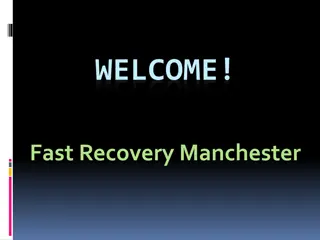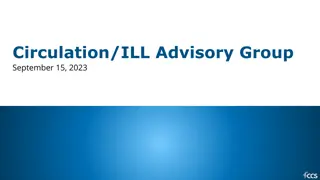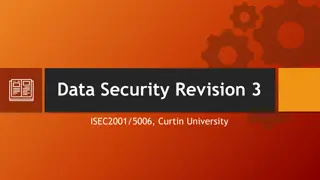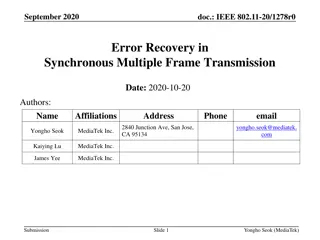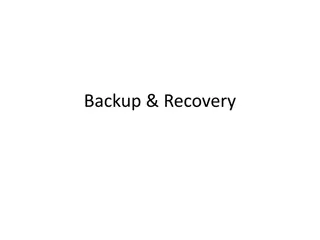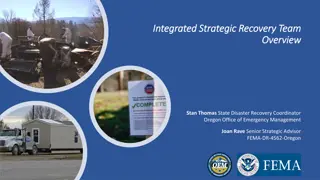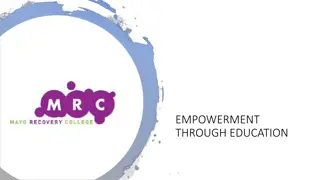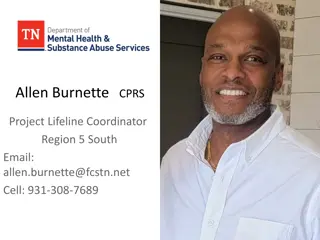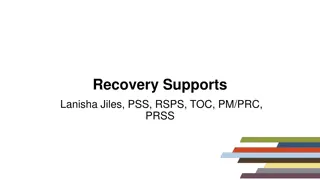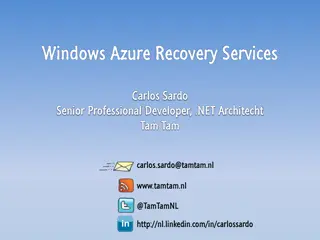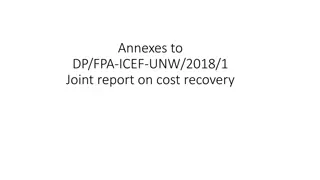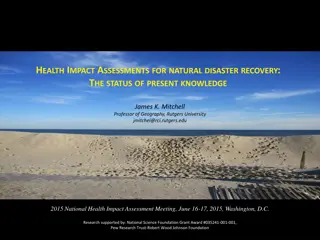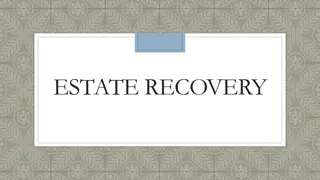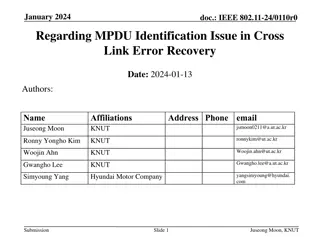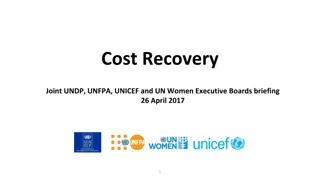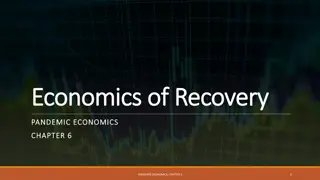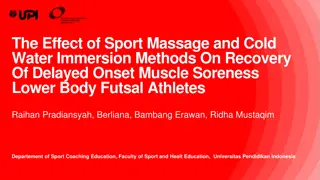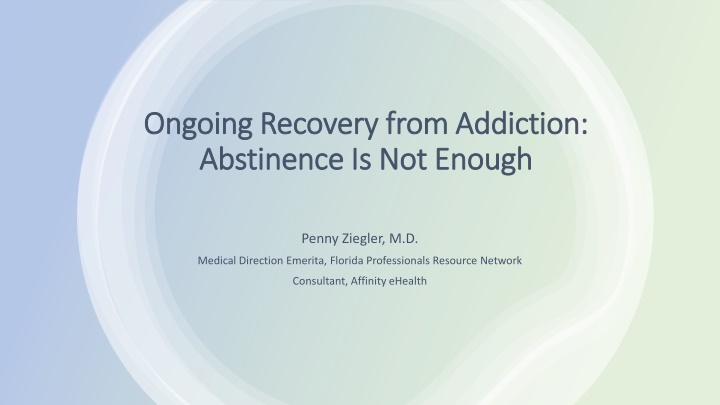
Ongoing Recovery and Treatment for Substance Use Disorders
Explore the complexities of ongoing recovery and treatment for substance use disorders, including the importance of addressing co-occurring disorders and common barriers to connection in recovery programs. Discover insights on personalized care and effective approaches beyond traditional methods.
Download Presentation

Please find below an Image/Link to download the presentation.
The content on the website is provided AS IS for your information and personal use only. It may not be sold, licensed, or shared on other websites without obtaining consent from the author. If you encounter any issues during the download, it is possible that the publisher has removed the file from their server.
You are allowed to download the files provided on this website for personal or commercial use, subject to the condition that they are used lawfully. All files are the property of their respective owners.
The content on the website is provided AS IS for your information and personal use only. It may not be sold, licensed, or shared on other websites without obtaining consent from the author.
E N D
Presentation Transcript
Ongoing Recovery Ongoing Recovery from Addiction Abstinence Abstinence Is Not Enough Is Not Enough from Addiction: : Penny Ziegler, M.D. Medical Direction Emerita, Florida Professionals Resource Network Consultant, Affinity eHealth
Disclosures Disclosures Consultant, Affinity eHealth
Current Approaches to Treatment for Current Approaches to Treatment for Substance Use Disorders Substance Use Disorders Most new addiction specialists are being taught that treatment involves medically supervised drug withdrawal followed by finding the right prescription drug to foster abstinence. Some programs and treatment centers are working to find ongoing support programs to reinforce and promote recovery; however, very few professionals really understand Twelve Step Programs in depth. If there are no effective medications for treating a particular patient s SUD, or if the patient says, I tried A.A. and it didn t work for me, many professionals are stymied.
All All Persons with SUDs Have Persons with SUDs Have Co Co- -Occurring Disorders Occurring Disorders There is no such thing as a pure alcoholic or a garden variety methamphetamine addict. For the patient in SUD treatment, the challenge for the treatment team and/or therapist is to recognize and address what make this patient special without reinforcing this thinking. By special , I mean identifying the components of resistance for this person: How does this person s denial system work? What are the person s triggers? What sets off craving? What fears are underlying the person s inability to connect and identify?
Common Components Blocking Common Components Blocking Connection and Identification Connection and Identification Persons who are members of racial, ethnic, religious or other groups underrepresented in Twelve Step Programs in their area Atheists and agnostics LGBTQ+ persons Trauma survivors Persons with other co-occurring psychiatric/ psychological disorders Persons with disabilities Persons with chronic pain Persons with neurodiversity Persons in recovery who are not happy, joyous and free
Even highly motivated persons with addiction often have difficulty identifying with program literature and discussions in meetings. Persons who are not at a point of surrender are definitely not willing to suspend disbelief and turn their will and their life over to care of a Higher Power. Court-ordered Spouse-ordered, etc. Mandated recovery in context of serious psychiatric and/or medical consequences Basic counseling skills and more advanced systems (such as Motivational Interviewing) address helping these folks to get into recovery and overcome initial resistance Finding a Finding a Recovery Home Recovery Home
Challenges of Ongoing Recovery Challenges of Ongoing Recovery Finding a recovery group where the person feels a sense of belonging Identifying and asking someone to be a sponsor Looking at the first three Steps, identifying and overcoming their issues Beginning the process of introspection in Step Four Overcoming the shame, guilt and fear via Step Five, then searching with the sponsor s help for patterns of self-defeating behaviors Developing the qualities of willingness, forgiveness and compassion through Step Six Embracing the positive aspects of humility in Step Seven
Challenges of Ongoing Recovery (cont.) Challenges of Ongoing Recovery (cont.) Listing the persons whom we have harmed, with a new-found honesty, introspection and willingness to make amends Approaching each person with humility, owning and focusing on our part in the relationship Implementing an ongoing awareness of the impact of our behavior on others, an accountability for our actions and an appreciation of the benefits of taking immediate action to make things right Deepening our spiritual connections and practices through ongoing seeking, consciousness expansion, and desire for enlightenment Using the spiritual awakening we have found in the process of working the previous Steps, reaching out to others and sharing the treasures of our own recovery in the hope that they will find the gifts we have founds, and then share them with others
Emotional Sobriety Emotional Sobriety Bill Wilson devoted many of his later writings to this subject In Bill s thinking, developing emotional sobriety is the process of growing up, becoming mature, responsible adults Many writers on recovery would go further, comparing emotional sobriety to the process of developing the capacity for honest introspection and understanding the origins of the persistent patterns that undermine the search for meaning, serenity and acceptance of life on life s terms These growth steps toward personal emotional and spiritual development require assistance Continued group and 1:1 work with the Twelve Steps Adding or substituting alternative approaches
Why Is Ongoing Participation in Recovery Why Is Ongoing Participation in Recovery Activities So Important? Activities So Important? On the most basic level, for many it is necessary to prevent late relapse Without ongoing attention, the chronic disease rears its ugly head and disrupts a positive experience of recovery For some, an ongoing connection in A.A., N.A., etc. or an alternative Fellowship is the pathway to enjoyable recovery For others, additional or alternative strategies are needed Professional psychotherapy with practitioners who have an in-depth understanding of addiction and ongoing recovery Participation in recovery experiences that enhance depth of recovery Identification and treatment of undiagnosed psychiatric/ psychological difficulties such as mood disorders, trauma-related disorders, persistent anxiety symptoms, etc.
More Alternative/ Add More Alternative/ Add- -On Approaches On Approaches Twelve Step study groups Twelve Step groups for specific communities (Women, Atheist/Agnostic, LGBTQ+, etc.) Reading and discussing non-conference-approved recovery literature Using the Twelve Traditions to deepen our understanding of relationships, organizations, family dynamics Al-Anon, ACOA, ACA, CODA, etc. Non-Twelve-Step programs Mindfulness, yoga, meditation, sound baths, Reiki, acupuncture, breath work and other non-chemical approaches to facilitating spiritual awakening Use of psychedelic substances
Resources for Twelve Step Alternatives Resources for Twelve Step Alternatives 1.SMART Recovery: Focuses on empowering the individual to sustain recovery, utilizing facilitated groups. 2.LifeRing: This secular group provides a healthy network of peers focused on remaining abstinent from drugs and alcohol. 3.Women for Sobriety (WFS): This nonprofit, abstinence-based program is made up of women supporting each other in recovery. 4.SOS. (Secular Organizations for Sobriety): This nonprofit network is made up of secular recovery-based groups. 5.Refuge Recovery, Recovery Dharma: These programs are based on non-theist Buddhist principles, mindfulness 6.Moderation Management (MM): This program is not based on abstinence but on learning how to moderate and control problem drinking behaviors.
References References Zemore SE, Kaskutas LA, Mericle A, Hemberg J. Comparison of 12-step groups to mutual help alternatives for AUD in a large, national study: Differences in membership characteristics and group participation, cohesion, and satisfaction. J Subst Abuse Treat. 2017 Feb;73:16-26. ZemoreSE, Ziemer KL, Gilbert PA, Karno MP, Kaskutas LA. Understanding the shared meaning of recovery from substance use disorders: new findings from the What is Recovery? study. 2023, Substance Abuse: Research and Treatment, Vol 17 Ashford RD, Brown A, Brown T, et al. Defining and operationalizing the phenomena of recovery: a working definition from the recovery science research collaborative. Addict Res Theory. 2019;27:179-188. Kaskutas LA, Borkman TJ, Laudet A, et al. Elements that define recovery: the experiential perspective. J Stud Alcohol Drugs. 2014;75:999-1010. Best D, Nisic M. Individual Paths to Recovery from Substance Use Disorder (SUD): What Are the Implications of the Emerging Recovery Evidence Base for Addiction Psychiatry and Practice? Psychiatr Clin North Am. 2022 Sep;45(3):547-556.
Questions? Questions?

